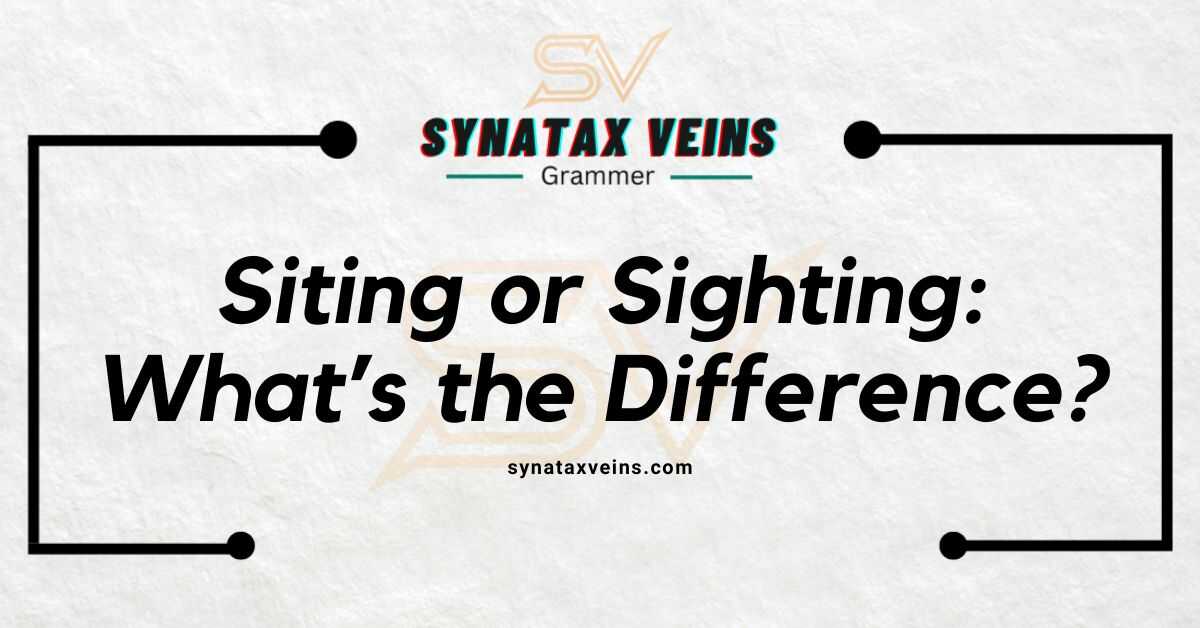Many people confuse sighting or siting because they sound similar. However, these words have different meanings and uses. Understanding them can improve grammar rules and help avoid writing errors in everyday communication and academic writing.
Quick Summary
Here is a simple breakdown of the differences:
| Word | Meaning | Example Usage |
|---|---|---|
| Sighting | The act of observing, spotting, or detecting something. | “A rare wildlife sighting occurred in the forest.” |
| Siting | Refers to location selection, positioning, or placement of something. | “The siting a building process requires careful land assessment.” |
| Citing | The act of referencing sources, quotation, or documentation in writing. | “Students must follow citation practices to avoid plagiarism.” |
Understanding Siting or Sighting
Many people confuse these words because they sound alike. However, they belong to different grammar rules and are used in various contexts. Sighting is about viewing something, siting relates to location selection, and citing refers to referencing sources.
Origins of the Sighting
The word sighting comes from Old English “sihth” which means “act of seeing.” Over time, it evolved into sighting observation, referring to moments when people witness or spot something unusual, such as a celebrity sighting or wildlife sighting.
Origins of the Siting
The word siting derives from the noun “site,” meaning a location, placement, or positioning of something. It is commonly used in urban planning siting, construction planning, and zoning discussions.
Sighting: Definition and Usage
A sighting refers to the act of seeing or observing something, often something unusual, rare, or noteworthy. It can describe encounters with wildlife, celestial events, unidentified objects, or even famous individuals.
The term is commonly used in reports of paranormal activity, UFOs, and rare animal appearances. Whether in everyday conversations or formal reports, “sighting” helps capture the significance of a notable visual experience.
Sighting Usage
Sighting definition refers to the act of observing, detecting, or spotting something. This term is often used in discussions about wildlife observation, notable sightings, and even rare animal spotting.
10 Synonyms of Sighting
- Observing
- Spotting
- Viewing
- Detecting
- Witnessing
- Seeing
- Identifying
- Tracking
- Noting
- Finding
READ MORE >>> Kippers vs. Sardines: Which One is Better for You?
When to Use Citing, Siting, or Sighting: Key Differences at a Glance
| Word | Meaning | Example |
| Citing | Referencing sources in academic writing | “Citing sources is important in research.” |
| Siting | Location selection or placement | “Proper siting location is key in construction planning.” |
| Sighting | Observing or detecting something | “She reported a rare observation of a bald eagle.” |
Common Mistakes and How to Avoid Them
Many people make writing errors by confusing these words. To avoid grammar mistakes, remember these tips:
- Sighting involves witnessing something.
- Siting relates to placing or positioning something.
- Citing is for source attribution and referencing sources.
Siting: Definition and Usage
Siting refers to the process of selecting and positioning a structure, object, or facility in a specific location. It plays a crucial role in urban planning, construction, and environmental assessments, ensuring that buildings, roads, and other projects are placed in the most efficient and suitable spots.
Proper siting considers factors like geography, accessibility, safety, and environmental impact, making it essential in infrastructure development and land management.
Siting Usage
Siting definition refers to selecting a location, placement, or positioning for a building or project. It is important in urban planning, construction planning, and land assessment.
10 Synonyms of Siting
- Placement
- Location
- Positioning
- Zoning
- Mapping
- Site selection
- Land assessment
- Property location
- Development planning
- Building allocation
Side by Side Comparison
| Aspect | Sighting | Siting | Citing |
| Meaning | Observing something | Selecting a location | Referencing sources |
| Example | “A celebrity sighting caused excitement.” | “Proper siting a building ensures stability.” | “Citing sources prevents plagiarism prevention.” |
| Common Use | Wildlife observation, notable sightings | Urban planning siting, property location | Legal citations, academic referencing |
Citing: Referencing or Quoting Sources
Citing sources is common in scholarly writing and legal referencing. Proper source attribution is crucial for avoiding plagiarism.
Siting: Selecting a Location
Siting location is essential in construction planning, land assessment, and zoning. Engineers must ensure proper placement to avoid environmental issues.
Sighting: Observing Something
People use sighting observation in contexts like rare observation, field study, and tracking animals in wildlife observation.
Mistake: Mixing up “Citing” and “Siting”
Many people confuse citing vs siting. Remember, citing is about academic referencing, while siting is about site selection.
Mistake: Confusing “Siting” and “Sighting”
A grammar mistake occurs when “siting” (location) is used instead of “sighting” (seeing). For example:
- Incorrect: “I had a siting of a rare bird.”
- Correct: “I had a sighting observation of a rare bird.”
Mistake: Using the Wrong Form
Common writing errors include misusing these words. A simple way to avoid mistakes is:
- Sight = See
- Site = Location
- Cite = Reference
Mistake #2: Confusing “Siting” and “Sighting”
A common grammar mistake occurs when people swap siting (location) with sighting observation (seeing something).
Incorrect: “There was a rare siting of a bald eagle in the park.”
Correct: “There was a rare wildlife sighting of a bald eagle in the park.”
🔹 Tip: If you’re talking about urban planning or siting a building, use siting. If it’s about observing something, use sighting.
Mistake #3: Using the Wrong Form
Writers sometimes use the wrong form of these words, especially in academic writing and legal referencing.
Incorrect: “The team was citing the best location for the factory.”
Correct: “The team was siting the location for the factory.”
🔹 Tip: Remember: Citing = Quoting, Siting = Locating, Sighting = Seeing.
Correct Plural Usage
Each of these words has a different plural form based on its meaning:
| Singular | Plural Usage | Example Sentence |
|---|---|---|
| Citing | Citations | “The lawyer provided multiple legal citations in court.” |
| Siting | Placements | “Several siting locations were evaluated for the new project.” |
| Sighting | Sightings | “There have been many rare animal sightings in this area.” |
🔹 Tip: Be mindful of the writing errors caused by misusing these words, especially in scholarly writing or construction planning.
Everyday Usage Examples
Citing in a Sentence:
- “The student was citing sources in her research paper.”
- “Legal citations are important in court documents.”
Siting in a Sentence:
- “The engineer focused on siting a building near a river.”
- “Proper urban planning siting prevents environmental damage.”
Sighting in a Sentence:
- “A rare wildlife sighting was reported in the national park.”
- “Many tourists hope for a celebrity sighting in Los Angeles.”
Frequently Asked Questions
What is the meaning of sighting something?
Sighting refers to the act of seeing or observing something, especially something unusual, rare, or noteworthy. It is often used in the context of spotting wildlife, celestial events, or mysterious objects like UFOs.
Is it sighting or citing a document?
It should be citing a document. Citing means referencing a source or evidence in writing, while sighting refers to seeing something.
What is the difference between sight and site?
- Sight relates to vision or the ability to see (e.g., “a beautiful sight”).
- Site refers to a location or place (e.g., “a construction site”).
What is the correct spelling of citing?
The correct spelling is citing when referring to quoting or referencing a source in writing.
What is the difference between citing and siting?
- Citing means referencing or quoting a source.
- Siting refers to choosing or positioning a location for a structure or object.
Is it on sight or on site?
- On sight means immediately upon seeing something (e.g., “The guards will stop intruders on sight.”).
- On site means at a specific location (e.g., “The workers are on site at the factory.”).
Conclusion
Understanding the difference between sighting or siting helps avoid grammar mistakes and improves writing clarity. Whether you are citing sources, siting a location, or reporting a sighting observation, knowing the right word ensures accuracy in academic writing, urban planning, and legal referencing. Keep this guide handy to avoid confusion and write with confidence!

